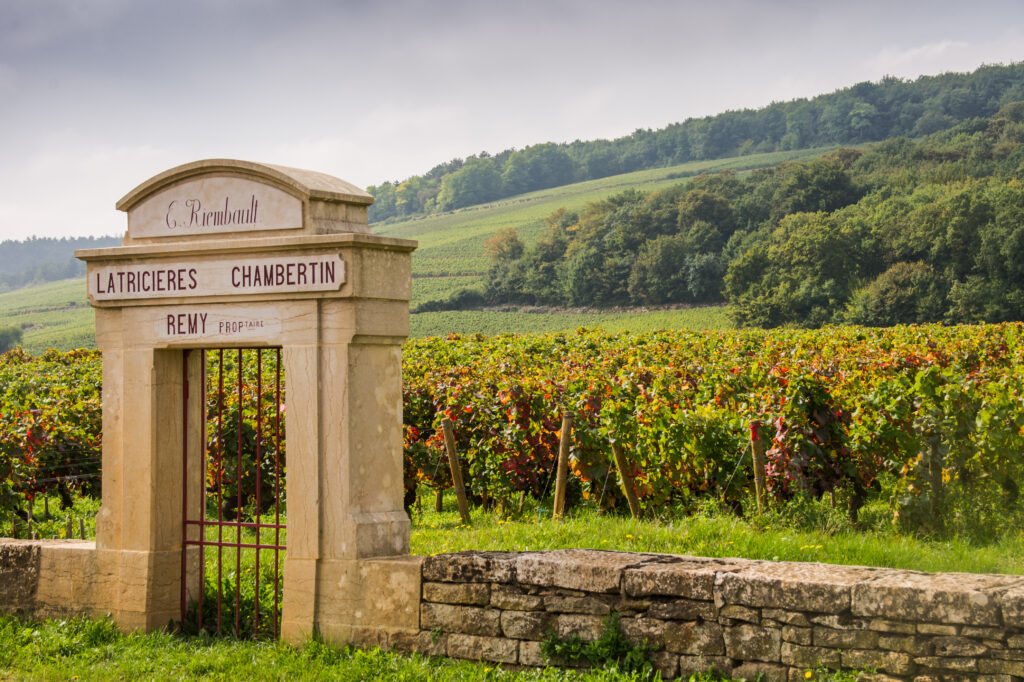Devonshire’s Guide to Burgundy Wines

Burgundy, the region in eastern France, is roughly 12,000 square miles of picturesque hills and valleys. The historic city of Dijon, with its stunning medieval and Renaissance architecture, art museums, culinary traditions, and delicious local cuisine, is widely viewed as the capital of the region.
Leaving the city and taking the small, winding roads that connect the villages and hamlets, you’ll be taken aback by the breath-taking beauty. The rows of ancient grapevines lacing the rolling hills act as a constant reminder of what Burgundy is famous for: its wine.
Known for its unique terroir—the combination of soil, climate, and topography—Burgundy wines are made primarily from two grape varieties: Pinot Noir for reds and Chardonnay for whites. Burgundy is further divided into five distinct areas, each with its own appellation system and regulations for grape growing and winemaking: Chablis in the far north of the region; Côte de Nuits just below Dijon, and Côte de Beaune below that; Côte Chalonnaise in the middle; and along the banks of the river Saône is Mâconnais in the south.
Red Burgundy wines
Red Burgundy wines are highly complex and nuanced, and they require careful attention and patience to fully appreciate their many layers and subtleties.
The grape primarily used for red Burgundies is Pinot Noir, a grape known for being—let’s say—finnicky. Their thin skins make them susceptible to disease and pests, and they prefer cool to moderate temperatures and well-drained soils.
However, it’s the grape’s sensitive nature is what makes the Burgundy region so special, as Pinot Noir is also known for its ability to express the terroir of the vineyard where it is grown. This means that even small variations in soil, climate, and other environmental factors can result in significant differences in the flavour and aroma profile of the resulting wine.
Tasting notes
Despite the fascinating variation within the region, there are some characteristics common to the Burgundies. Look out for aromas of red fruit, such as cherry, strawberry, and raspberry, as well as earthy and floral notes. On the palate, these wines are typically light- to medium-bodied, with a silky texture and fine tannins.
The wines often have a high level of acidity, which contributes to their freshness and aging potential. And as they age, red Burgundies can develop complex aromas and flavours of spices, leather, and forest floor.
White Burgundy wines
Chardonnay grapes are one of the most widely planted grape varieties in the world and are known for their versatility in winemaking. However, Chardonnay grapes have special significance in Burgundy, where they thrive in the cool climate and moisture-retaining limestone soils and are the main grape variety used to produce some of the world's most highly regarded white wines.
Tasting notes
There is great variety within the white wines of Burgundy: from the dry and light-bodied Chablis in the north with its aromas of green apple, lemon, and flint; to Meursault near Dijon, which is creamy and full-bodied with flavours of baked apples, vanilla, and a hint of butter.
Puligny-Montrachet is a complex and elegant white wine that is known for its floral and mineral notes. And we cannot forget the powerful and structured Corton-Charlemagne. Deep golden colours and aromas of toasted almonds, honey, and baked apple give way to a full-bodied and rich flavour of ripe peaches, vanilla, and a hint of oak.
Overall, white wines from Burgundy are known for their complexity, elegance, and balance. They are some of the most sought-after white wines in the world, and they pair well with a variety of foods, including seafood, poultry, and creamy sauces.
Burgundy wines at Devonshire Hotels
On the evening of May 5th, 2023, The Devonshire Arms Hotel & Spa will be welcoming distinguished Master of Wine, John Atkinson, to host a very special Wine Dinner. John will take you through the best of Burgundy, from the aromatic 2019 Chablis Dampt to the classic and rich Nuits St Georges les Murgers 2005 Cathiard. Each fine wine will be beautifully paired with a specially prepared course from the evening’s menu.
Whether you're a wine connoisseur or simply enjoy a good glass of wine, The Devonshire Arms' Burgundy wine tasting evening promises to be a delightful experience that you won't forget.